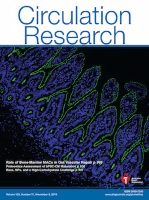
CIRCULATION RESEARCH
Scope & Guideline
Leading the way in cardiovascular research since 1953.
Introduction
Aims and Scopes
- Cardiovascular Biology and Physiology:
Research exploring the fundamental biological processes and physiological mechanisms that govern cardiovascular function, including cardiac muscle function, endothelial biology, and vascular dynamics. - Pathophysiology of Cardiovascular Diseases:
Studies investigating the molecular and cellular mechanisms involved in various cardiovascular diseases such as heart failure, myocardial infarction, atherosclerosis, and arrhythmias. - Translational Research:
Research aimed at translating basic scientific discoveries into clinical applications, including the development of new therapeutic strategies and interventions for cardiovascular diseases. - Innovative Therapeutic Approaches:
Exploration of novel therapeutic modalities, including gene therapy, stem cell therapy, and advanced biomaterials for cardiovascular repair and regeneration. - Environmental and Lifestyle Factors in Cardiovascular Health:
Research assessing the impact of environmental exposures, lifestyle choices, and metabolic factors on cardiovascular health and disease progression. - Immunology and Inflammation in Cardiovascular Diseases:
Investigations into the roles of immune cells and inflammatory processes in the development and progression of cardiovascular conditions. - Genomics and Personalized Medicine:
Studies leveraging genetic and genomic insights to understand individual variations in cardiovascular disease risk and response to therapies.
Trending and Emerging
- Single-Cell and Multi-Omics Approaches:
An increasing number of studies are utilizing single-cell RNA sequencing and multi-omics approaches to unravel the complex cellular heterogeneity and molecular mechanisms underlying cardiovascular diseases. - Cardiac Regeneration and Repair:
Research into cardiac regeneration, including the potential of stem cells and engineered tissues, is gaining traction, driven by the need for innovative treatments for heart failure and myocardial infarction. - Microbiome and Cardiovascular Interactions:
Emerging evidence highlights the significant role of gut microbiota in modulating cardiovascular health, with studies exploring how microbial metabolites influence cardiac function and disease. - Inflammation and Immunology:
There is a growing focus on the role of inflammation and immune responses in cardiovascular diseases, with research investigating the interactions between immune cells and cardiovascular tissues. - Mitochondrial Biology and Metabolism:
Increased attention is being given to mitochondrial function and bioenergetics in the context of cardiovascular health, emphasizing the importance of metabolic pathways in disease mechanisms. - Artificial Intelligence and Machine Learning:
The application of artificial intelligence and machine learning techniques to analyze complex cardiovascular data sets is on the rise, aiding in risk prediction and personalized treatment strategies.
Declining or Waning
- Traditional Pharmacology:
Research centered on conventional pharmacological interventions for cardiovascular diseases has become less prominent, as the field increasingly embraces innovative therapeutic strategies such as gene therapy and personalized medicine. - Basic Animal Models of Cardiovascular Disease:
There is a noticeable decline in studies utilizing classical animal models in favor of more sophisticated models, including human-induced pluripotent stem cell (hiPSC) systems and organ-on-a-chip technologies. - Purely Descriptive Studies:
The journal has moved away from purely descriptive studies of cardiovascular conditions, focusing instead on mechanistic insights and translational applications that provide clear therapeutic implications. - Static Imaging Techniques:
The reliance on traditional static imaging techniques is diminishing as dynamic and advanced imaging modalities, such as multimodal imaging and real-time imaging, become more prevalent in cardiovascular research.
Similar Journals
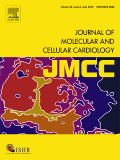
JOURNAL OF MOLECULAR AND CELLULAR CARDIOLOGY
Innovating research for a healthier heart and body.JOURNAL OF MOLECULAR AND CELLULAR CARDIOLOGY, published by Elsevier Science Ltd, is a premier scholarly journal dedicated to advancing the field of cardiology and cardiovascular medicine as well as molecular biology. With an impressive Q1 ranking in both categories as of 2023, the journal boasts a significant influence in the scientific community, evidenced by its Scopus rankings—33rd out of 387 in Cardiology and 65th out of 410 in Molecular Biology. Established in 1970 and continuing to publish groundbreaking research through 2024, the journal’s mission is to disseminate innovative findings that enhance our understanding of cardiovascular health at the molecular and cellular levels. Although it is not an open-access publication, it attracts top-tier research contributions, making it essential reading for researchers, healthcare professionals, and students aiming to stay ahead in the dynamic domains of cardiovascular and molecular biology research.

Netherlands Heart Journal
Elevating Standards in Cardiology with Cutting-Edge FindingsNetherlands Heart Journal is a premier academic publication dedicated to advancing knowledge in the field of cardiology and cardiovascular medicine. Published by BOHN STAFLEU VAN LOGHUM BV, this journal has established itself as a critical platform for researchers, professionals, and students seeking to explore groundbreaking findings and innovative practices in cardiovascular health. With an ISSN of 1568-5888 and E-ISSN 1876-6250, the journal boasts a respectable Q2 ranking in the Cardiology and Cardiovascular Medicine category, placing it in the top half of its field according to the 2023 quartiles. The Scopus ranking places it 130th out of 387 in the relevant category, indicating a commendable percentile rank of 66th, which attests to its influence and quality of published research. Spanning from 2005 to 2024, the journal endeavors to include a diverse array of topics, encompassing clinical practice, technological innovations, and public health considerations related to cardiovascular diseases. Researchers and practitioners are encouraged to engage with the journal's robust content, contributing to and benefiting from the collaborative effort to enhance cardiovascular health worldwide.
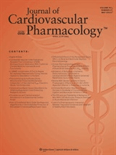
JOURNAL OF CARDIOVASCULAR PHARMACOLOGY
Fostering collaboration in the realm of cardiovascular pharmacology.JOURNAL OF CARDIOVASCULAR PHARMACOLOGY, published by LIPPINCOTT WILLIAMS & WILKINS, is a leading peer-reviewed journal dedicated to the exploration and advancement of pharmacological therapies related to cardiovascular diseases. With its ISSN 0160-2446 and E-ISSN 1533-4023, this esteemed journal has been at the forefront of cardiovascular research since its inception in 1979, continuously offering insights until 2024. It holds a commendable position in the 2023 category quartiles, classified as Q2 in both Cardiology and Cardiovascular Medicine, as well as Medicine (miscellaneous) and Pharmacology, showcasing its significance within these fields. The journal presents a unique platform for researchers, health professionals, and students to disseminate their findings, fostering an environment of knowledge growth and collaboration in cardiovascular pharmacology. Readers can expect to find high-quality articles that contribute to the body of knowledge in cardiovascular therapies, ensuring they remain informed of the latest advancements and clinical practices. Discover more about this influential publication and its commitment to enhancing cardiovascular health.
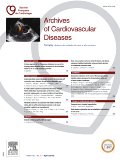
Archives of Cardiovascular Diseases
Connecting clinicians and researchers for a healthier heart.The Archives of Cardiovascular Diseases, published by Elsevier Masson, stands as a leading journal in the field of cardiology and cardiovascular medicine, with an impressive impact factor that underscores its relevance and influence. This esteemed journal, recognized in the Q2 category for both cardiology and miscellaneous medicine, aims to disseminate groundbreaking research, innovative methodologies, and clinical advancements that can shape the future of cardiovascular health. With its diverse array of open access options, researchers and students alike have the ability to engage with high-quality content, ensuring that cutting-edge findings are accessible globally. Since its inception in 2008, the journal has actively contributed to the advancement of knowledge in cardiovascular diseases, fostering collaboration among clinicians, researchers, and educators. Headquartered in Paris, France, Archives of Cardiovascular Diseases remains committed to enhancing our understanding of cardiovascular health and improving patient outcomes worldwide.
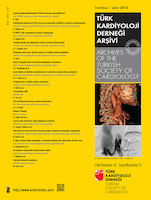
Turk Kardiyoloji Dernegi Arsivi-Archives of the Turkish Society of Cardiology
Driving evidence-based practices in cardiology.Turk Kardiyoloji Dernegi Arsivi-Archives of the Turkish Society of Cardiology is a prominent peer-reviewed journal dedicated to advancing the field of cardiology and cardiovascular medicine. Published by KARE PUBL, this journal has established itself as a key resource for researchers, healthcare professionals, and students since its inception in 1990. As an Open Access journal since 2017, it ensures that cutting-edge research and clinical findings are readily accessible to a global audience, thus fostering collaboration and knowledge sharing among the cardiology community. With its recent rank in the Q3 quartile for Cardiology and Cardiovascular Medicine in 2023, and a Scopus rank of #282 out of 387, the journal is positioned to enhance its influence in the cardiovascular field, offering valuable insights and promoting evidence-based practices. The journal covers a wide range of topics within cardiology and cardiovascular research, making it an essential platform for scholars aiming to contribute to the ongoing dialogue in this vital area of medicine. For those eager to stay updated with the latest research trends and clinical practices in cardiology, Turk Kardiyoloji Dernegi Arsivi represents a crucial resource.

American Journal of Cardiovascular Drugs
Connecting Professionals with Cutting-Edge Cardiovascular InsightsAmerican Journal of Cardiovascular Drugs, published by ADIS INT LTD, is a premier peer-reviewed journal dedicated to the field of cardiology and cardiovascular medicine. With an ISSN of 1175-3277 and an E-ISSN of 1179-187X, this esteemed journal has established itself as a crucial platform for disseminating high-quality research since its inception in 2001. It holds a significant position in its domain, ranking in the second quartile (Q2) across several categories including Cardiology, Medicine (miscellaneous), and Pharmacology (medical) for the year 2023. With its Scopus ranks placing it in the 81st percentile for Cardiology and 77th percentile for Pharmacology, the journal is highly regarded among professionals, researchers, and students alike. While it is not an open-access journal, its comprehensive articles and systematic reviews provide an in-depth exploration of cardiovascular drug therapy, therapeutic advancements, and clinical practices, making it an invaluable resource for anyone invested in the future of cardiovascular health.
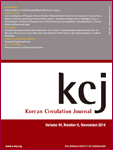
Korean Circulation Journal
Pioneering Insights in Cardiology and Cardiovascular Medicine.Korean Circulation Journal, published by the Korean Society of Cardiology, has established itself as a prominent platform for disseminating research in the fields of Cardiology and Cardiovascular Medicine. With an ISSN of 1738-5520 and an E-ISSN of 1738-5555, this journal has been at the forefront of cardiovascular science since its inception in 2006 and is projected to continue until 2024. The journal's commitment to quality is reflected in its 2023 category quartiles, ranking in the second quartile (Q2) for both Cardiology and Internal Medicine, as well as its commendable Scopus rankings within the respective fields. Located in South Korea, the journal aims to bridge the gap between cutting-edge research and practical applications, serving as an invaluable resource for researchers, healthcare professionals, and students keen on advancing their understanding of cardiovascular health. Although currently not an open-access journal, it provides a wealth of knowledge that encourages evidence-based practice in clinical settings.
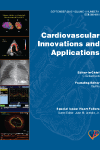
Cardiovascular Innovations and Applications
Empowering healthcare professionals with the latest cardiovascular innovations.Cardiovascular Innovations and Applications is a premier open-access journal dedicated to advancing knowledge in the field of cardiovascular medicine. Published by COMPUSCRIPT since 2016, this journal provides a platform for the dissemination of innovative research and applications that address crucial topics in cardiology, aiming to bridge the gap between clinical practice and cutting-edge research. With an ISSN of 2009-8618 and an E-ISSN of 2009-8782, it operates on a global scale, facilitating access to high-quality content without financial barriers. The journal is positioned within the Medicine - Cardiology and Cardiovascular Medicine category, and its current Scopus rank of #321/387 reflects its potential for growth and influence in the academic community, being in the 17th percentile. Researchers, healthcare professionals, and students will find Cardiovascular Innovations and Applications an invaluable resource in their quest for the latest findings and advancements in cardiovascular health and treatment methodologies.

Frontiers in Cardiovascular Medicine
Championing Breakthroughs in Heart Health Science.Frontiers in Cardiovascular Medicine is a leading open-access journal published by FRONTIERS MEDIA SA, dedicated to advancing research in the field of cardiology and cardiovascular medicine. Since its inception in 2014, the journal has become a vital platform for the dissemination of high-quality research, boasting a commendable Q2 rank in the 2023 category for Cardiology and Cardiovascular Medicine. With a focus on promoting innovative studies and clinical insights, Frontiers in Cardiovascular Medicine facilitates open access to its content, allowing researchers, healthcare professionals, and students from around the globe to engage with the latest findings which are critical for the advancement of cardiovascular health. The journal's significant presence in the academic landscape, as indicated by its Scopus ranking (161/387 and 58th percentile), underscores its importance as a research outlet in this essential field. Located in Lausanne, Switzerland, the journal continues to support the global cardiovascular community by encouraging collaboration and knowledge sharing to address the challenges faced in cardiovascular medicine today.
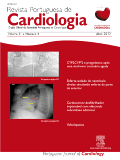
Revista Portuguesa de Cardiologia
Empowering the fight against heart disease through open access research.Revista Portuguesa de Cardiologia, published by Elsevier España SLU, stands as a pivotal resource in the realm of Cardiology and Cardiovascular Medicine. With its origins tracing back to 1970, this journal has cultivated a robust academic presence, achieving a 2023 Q3 ranking in its category, and currently holding a position of #220 out of 387 on the Scopus rankings, placing it within the 43rd percentile of its field. This open access journal, available since 2011, aims to disseminate high-quality research and insights relevant to contemporary cardiovascular issues. Its commitment to accessibility and knowledge exchange enhances its importance for clinicians, researchers, and students alike, fostering a more informed community in the fight against cardiovascular diseases. Operating from its base in Barcelona, Spain, the journal welcomes contributions that further the understanding and treatment of heart conditions, contributing significantly to the advancement of cardiovascular health.